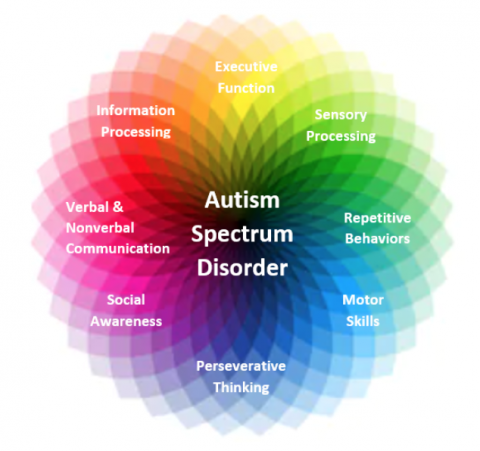Comprehending the Range: A Comprehensive Guide to Autism Awareness
Sustaining Individuals With Autism: Finest Practices in Education And Learning and Inclusion
The support of individuals with autism within instructional settings requires a nuanced understanding of ideal methods that advertise addition and effective understanding. Stressing structured atmospheres, tailored training methods, and joint efforts among educators and families can significantly boost the educational experience for students on the spectrum.
Recognizing Autism Spectrum Disorder
Autism Range Problem (ASD) is a complicated neurodevelopmental problem identified by a variety of challenges in social communication, interaction, and behavior. autism. Individuals with ASD might display a range of symptoms and qualities, frequently resulting in an unique profile of toughness and troubles. The spectrum nature of the condition indicates that symptoms can vary dramatically in intensity, with some people calling for significant assistance while others may operate separately
ASD usually materializes in early childhood, with indications often observable by the age of two or 3. Common attributes include problems in understanding social hints, difficulties in participating in reciprocal conversations, and a preference for regimens or recurring actions. Sensory sensitivities are also widespread, affecting exactly how people procedure and respond to sensory input from their environment.
Comprehending these attributes is crucial for cultivating efficient support methods. Exact recognition of ASD signs can lead to timely treatments that can considerably enhance an individual's lifestyle. Recognizing the varied methods in which the disorder manifests assists instructors, caregivers, and experts tailor their techniques to fulfill the distinct requirements of each person on the autism spectrum.
Creating Inclusive Understanding Environments
Developing a comprehensive discovering environment is vital for sustaining people with Autism Spectrum Problem and promoting their scholastic and social success. Such settings prioritize acceptance, understanding, and partnership among all trainees, fostering a sense of belonging. This approach needs the energetic participation of peers, parents, and educators, developing an area that values diversity and inclusivity.
To achieve inclusivity, physical classroom plans need to accommodate numerous sensory demands, offering silent locations and versatile seating alternatives. Aesthetic assistances, such as schedules and cue cards, can help understanding and predictability, necessary for several trainees with autism. Carrying out clear expectations and structured routines helps lower anxiety and boosts finding out chances.
Partnership amongst team is important. Educators needs to engage in continuous expert growth to much better understand autism and its ramifications for learning. Producing collaborations with specialized specialists, such as speech therapists and occupational specialists, can further improve the assistance offered to trainees.
Eventually, promoting a comprehensive learning setting not just advantages students with autism however enhances the educational experience for all learners, promoting empathy, regard, and a much deeper understanding of private differences. This collective effort is necessary for growing a encouraging and engaging academic atmosphere.
Reliable Educating Approaches
To successfully sustain individuals with Autism Spectrum Disorder in the class, instructors must employ a range of mentor methods that satisfy the unique knowing styles and demands of these trainees. One effective approach is the use of aesthetic aids, such as photos, layouts, and graphes, which can boost understanding and retention of information. These tools aid clear up intricate ideas and provide a referral factor for pupils.
Additionally, applying organized regimens and clear assumptions can create a feeling of stability and predictability, which is vital for numerous people with autism. It is additionally useful to incorporate hands-on learning chances, as these experiences can promote involvement and sensible application of abilities.
Distinguished instruction must be a keystone of teaching approaches, enabling instructors to tailor helpful resources lessons to individual toughness and difficulties. Utilizing social stories can help in developing social abilities and recognizing social signs, bridging communication gaps.
Finally, routine feedback and favorable support can enhance and motivate pupils wanted behaviors. By incorporating these approaches, teachers can develop a effective and inclusive learning setting that sustains the growth and development of students with Autism Spectrum Problem.
Collaborating With Communities and households
Effective cooperation with areas and households plays an important function in supporting people with Autism Spectrum Disorder. Involving them in the decision-making process makes sure that instructional strategies are customized to specific toughness and challenges.
Institutions need to help with open communication networks, such as regular meetings, workshops, and feedback sessions, to foster a sense of neighborhood and trust. Additionally, involving neighborhood companies can supply access to resources and support services that extend beyond the class, boosting social chances and skill advancement for individuals with autism.
Professional advancement for instructors should also stress the value of family members engagement and area partnership. Educating on culturally receptive methods can aid instructors better comprehend and incorporate varied household viewpoints. Eventually, a collective strategy not just equips families however additionally improves the finding out experiences of people with autism, creating an encouraging ecosystem that advertises their total wellness and success.
Promoting Social Abilities and Communication
Advertising social abilities and interaction is vital for individuals with Autism Range Problem, as these abilities are foundational for constructing partnerships and browsing social contexts. Efficient strategies for enhancing social competencies include structured social abilities training, peer-mediated treatments, and using social stories.
Social skills training programs can be tailored to address details deficits such as initiating discussions, comprehending non-verbal cues, and taking turns during communications. These programs commonly integrate role-playing circumstances to give useful experience and responses. In addition, peer-mediated interventions, where generally creating peers are involved, can assist in naturalistic social communications, promoting a supportive atmosphere for individuals with autism.

In addition, Website creating inclusive environments in colleges and area settings motivates chances for social interaction - autism. By advertising understanding and approval among peers, the potential for meaningful communications boosts, eventually resulting in higher social skills and psychological well-being for individuals with autism

Final Thought
In conclusion, carrying out ideal techniques for supporting individuals with autism in educational setups is crucial for promoting incorporation and understanding. Structured routines, aesthetic help, and partnership amongst instructors, households, and community organizations boost discovering experiences and address individual demands.
The assistance of individuals with autism within academic settings requires a nuanced understanding of best practices that promote inclusion and efficient knowing.Creating a comprehensive understanding environment is vital for supporting people with Autism Range Problem and advertising their social and scholastic success.To important site efficiently support people with Autism Spectrum Condition in the class, instructors should employ a variety of training methods that cater to the unique knowing styles and requirements of these trainees.Reliable collaboration with families and communities plays a critical duty in supporting people with Autism Spectrum Disorder - autism. In addition, peer-mediated treatments, where normally creating peers are entailed, can help with naturalistic social interactions, promoting an encouraging atmosphere for individuals with autism